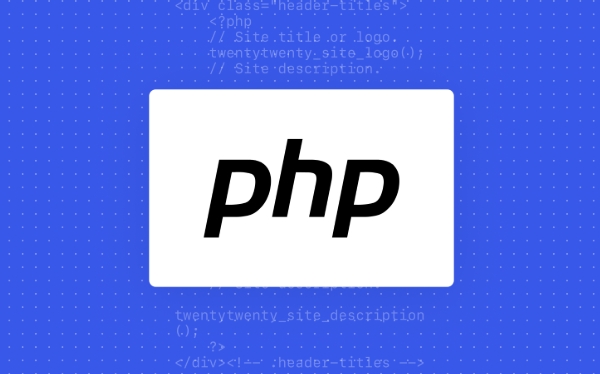 Backend Development
Backend Development
 PHP Tutorial
PHP Tutorial
 The Lifecycle of a PHP Variable: From Allocation to Garbage Collection
The Lifecycle of a PHP Variable: From Allocation to Garbage Collection
The Lifecycle of a PHP Variable: From Allocation to Garbage Collection
Jul 24, 2025 pm 10:49 PMA PHP variable's lifecycle begins with memory allocation via zval creation, which stores the value, type, reference count, and reference flag. 2. When variables are assigned or shared, PHP uses reference counting and copy-on-write to optimize memory usage, only duplicating data when necessary. 3. At scope exit or after unset(), the reference count decreases, and if it reaches zero, memory is immediately freed. 4. For circular references where reference counts never reach zero, PHP’s cyclic garbage collector identifies and cleans up unreachable cycles. 5. Memory is eventually returned to the system or reused, ensuring efficient resource management throughout the variable’s lifecycle.

A PHP variable doesn’t just appear out of thin air — it goes through a well-defined lifecycle from the moment you assign it a value to the moment PHP cleans it up. Understanding this lifecycle helps you write more efficient, predictable code and debug memory issues more effectively. Let’s walk through how PHP handles variables under the hood, from creation to cleanup.

Variable Creation and Memory Allocation
When you write something like:
$number = 42;
PHP doesn’t just store the value — it allocates memory for a zval (Zend value), the internal structure that holds all information about a variable.

A zval contains:
- The actual value (e.g.,
42) - The type (e.g.,
IS_LONG) - A reference count (used for reference counting)
- A flag indicating whether it’s a reference or not
At this point, the reference count is set to 1 because one variable ($number) points to this zval.

This allocation happens in PHP’s userland memory space, managed by Zend Engine. The exact location (stack or heap) depends on context — local variables in functions may live on the stack, while complex or long-lived values go on the heap.
Reference Counting and Copy-on-Write
PHP uses reference counting as its primary mechanism for tracking when a variable is no longer needed.
Let’s expand the example:
$a = "hello"; $b = $a; // Both $a and $b point to the same zval
Now, the zval holding "hello" has a reference count of 2. But PHP doesn’t immediately make a full copy — it uses copy-on-write (COW) optimization.
If you later modify $b:
$b = "world";
PHP detects that the zval is shared and not actually referenced (i.e., not a true reference via &), so it creates a new zval for $b, decrements the old one’s count, and assigns the new value. This avoids unnecessary duplication and saves memory.
But if you do:
$b = &$a;
Now both variables are true references to the same zval. Modifying one affects the other, and the reference count increases — but more importantly, the is_ref flag is set, which changes how future assignments behave.
Scope and Unsetting: When References Drop
Variables naturally go out of scope when a function ends:
function greet() {
$message = "Hi!";
// $message exists
}
// $message is now out of scopeWhen the function exits, the symbol table for that scope is destroyed. Each variable in it decrements the reference count of its zval. If the count reaches zero, PHP can immediately free the memory.
You can also manually reduce the count with unset():
$a = [1, 2, 3]; unset($a); // Reference count drops; if no other refs, zval is freed
Note: unset() doesn’t necessarily free memory — it just removes the variable’s reference. If another variable (like $b = $a) shares the same zval, the count drops but the value persists.
Garbage Collection: Cleaning Up Cycles
Reference counting works well — until you hit circular references.
Example:
$a = []; $b = []; $a['b'] = $b; $b['a'] = $a; // Now unset both unset($a, $b);
Even after unsetting, the two zvals still point to each other, so their reference counts are 1, not 0. They’re unreachable but not freed — a memory leak.
This is where PHP’s cyclic garbage collector steps in.
PHP runs a periodic garbage collection cycle (triggered manually with gc_collect_cycles() or automatically under certain conditions) that:
- Looks for
zvalswith reference counts > 0 that are no longer reachable from the root symbol tables - Identifies cycles using a root buffer and a depth-first search
- Frees the memory if a cycle is confirmed as garbage
You can control this behavior:
-
gc_enable()/gc_disable()— toggle GC -
gc_collect_cycles()— force collection -
gc_status()— check runs, collected, memory usage
Summary: The Full Lifecycle
-
Allocation: A
zvalis created when you assign a value. - Usage: Variables may be shared via copy-on-write or true references.
- Scope Exit / Unset: Reference count drops; if zero, memory is freed.
- Cycle Detection: If reference count never hits zero due to cycles, the GC intervenes.
- Cleanup: Memory is returned to the system (or kept for reuse in PHP’s memory manager).
Understanding this flow helps you avoid common pitfalls — like memory leaks from closures capturing objects, or unexpected sharing between variables. While PHP handles most of this automatically, knowing when and how variables die makes you a better PHP developer.
Basically: PHP is smart, but not magic.
The above is the detailed content of The Lifecycle of a PHP Variable: From Allocation to Garbage Collection. For more information, please follow other related articles on the PHP Chinese website!

Hot AI Tools

Undress AI Tool
Undress images for free

Undresser.AI Undress
AI-powered app for creating realistic nude photos

AI Clothes Remover
Online AI tool for removing clothes from photos.

Clothoff.io
AI clothes remover

Video Face Swap
Swap faces in any video effortlessly with our completely free AI face swap tool!

Hot Article

Hot Tools

Notepad++7.3.1
Easy-to-use and free code editor

SublimeText3 Chinese version
Chinese version, very easy to use

Zend Studio 13.0.1
Powerful PHP integrated development environment

Dreamweaver CS6
Visual web development tools

SublimeText3 Mac version
God-level code editing software (SublimeText3)

Hot Topics
 The Case Against the `global` Keyword: Strategies for Cleaner Code
Jul 25, 2025 am 11:36 AM
The Case Against the `global` Keyword: Strategies for Cleaner Code
Jul 25, 2025 am 11:36 AM
Avoidusingtheglobalkeywordunnecessarilyasitleadstocodethatishardertotest,debug,andmaintain;instead,usefunctionparametersandreturnvaluestopassdataexplicitly.2.Replaceglobalvariableswithpurefunctionsthatdependonlyontheirinputsandproduceoutputswithoutsi
 Passing Variables by Reference vs. By Value in Functions
Jul 26, 2025 am 09:49 AM
Passing Variables by Reference vs. By Value in Functions
Jul 26, 2025 am 09:49 AM
Passbyvaluemeansacopyofthedataispassed,sochangesinsidethefunctiondonotaffecttheoriginalvariable,asseeninCwithprimitivesorPythonwithimmutabletypes.2.Passbyreferencemeansthefunctionreceivesadirectreferencetotheoriginal,somodificationsinsidethefunctiona
 The Lifecycle of a PHP Variable: From Allocation to Garbage Collection
Jul 24, 2025 pm 10:49 PM
The Lifecycle of a PHP Variable: From Allocation to Garbage Collection
Jul 24, 2025 pm 10:49 PM
APHPvariable'slifecyclebeginswithmemoryallocationviazvalcreation,whichstoresthevalue,type,referencecount,andreferenceflag.2.Whenvariablesareassignedorshared,PHPusesreferencecountingandcopy-on-writetooptimizememoryusage,onlyduplicatingdatawhennecessar
 Modernizing Your Classes with PHP Typed Properties
Jul 26, 2025 am 09:49 AM
Modernizing Your Classes with PHP Typed Properties
Jul 26, 2025 am 09:49 AM
TypedpropertiesinPHP7.4 allowdirecttypedeclarationforclassproperties,improvingreliability,IDEsupport,andcodeclarity;2.Theyenforcetypesafety,reducebugs,enablebetterautocompletion,andminimizeconstructorchecks;3.Tomigrate,useexisting@vardocblockstoaddty
 A Deep Dive into PHP Superglobals: Beyond `$_GET` and `$_POST`
Jul 26, 2025 am 09:41 AM
A Deep Dive into PHP Superglobals: Beyond `$_GET` and `$_POST`
Jul 26, 2025 am 09:41 AM
PHPsuperglobalsinclude$_GET,$_POST,$_REQUEST,$_SESSION,$_COOKIE,$_SERVER,$_FILES,$_ENV,and$GLOBALS,eachservingdistinctpurposesbeyondjusthandlingformdata;theyenablestatemanagement,serverinteraction,andenvironmentaccess.1.$_REQUESTcombines$_GET,$_POST,
 Demystifying PHP's Variable Variables (`$$var`)
Jul 25, 2025 am 04:42 AM
Demystifying PHP's Variable Variables (`$$var`)
Jul 25, 2025 am 04:42 AM
Variable variables use the value of one variable as the name of another variable through the $$var syntax; 2. For example, when $myVar is "hello", $$myVar is equivalent to $hello and can be assigned a value; 3. In practical applications, it can be used to dynamically process form data, such as traversing $_POST with foreach and creating corresponding variables with $$key; 4. There are problems such as poor readability, high security risks, and disrupting static analysis, especially avoiding the use of $$ for user input; 5. It is recommended to use arrays or objects instead of creating dynamic variables, such as storing data into $data array instead of creating dynamic variables; 6. Using ${$var} curly brace syntax can improve code clarity, especially in complex scenarios. Variable change
 PHP Constants vs. Variables: A Guide to Immutability
Jul 25, 2025 pm 05:37 PM
PHP Constants vs. Variables: A Guide to Immutability
Jul 25, 2025 pm 05:37 PM
Constantscannotbechangedafterdefinition,whilevariablescan;1.Variablesstartwith$,aremutable,scoped,andidealfordynamicdata;2.Constantsusedefine()orconst,haveno$,areimmutable,globallyscoped,andbestforfixedvalueslikeconfiguration;3.Useconstantsforunchang
 The Nuances of `isset()`, `empty()`, and `is_null()` for Variable Validation
Jul 24, 2025 pm 10:15 PM
The Nuances of `isset()`, `empty()`, and `is_null()` for Variable Validation
Jul 24, 2025 pm 10:15 PM
isset()checksifavariableisdeclaredandnotnull,returningtrueforemptystrings,0,'0',false,andemptyarrays;useittoconfirmavariableexistsandhasbeenset,suchasverifyingforminputslike$_POST['email'].2.empty()determinesifavalueis"empty"inauser-logicse





